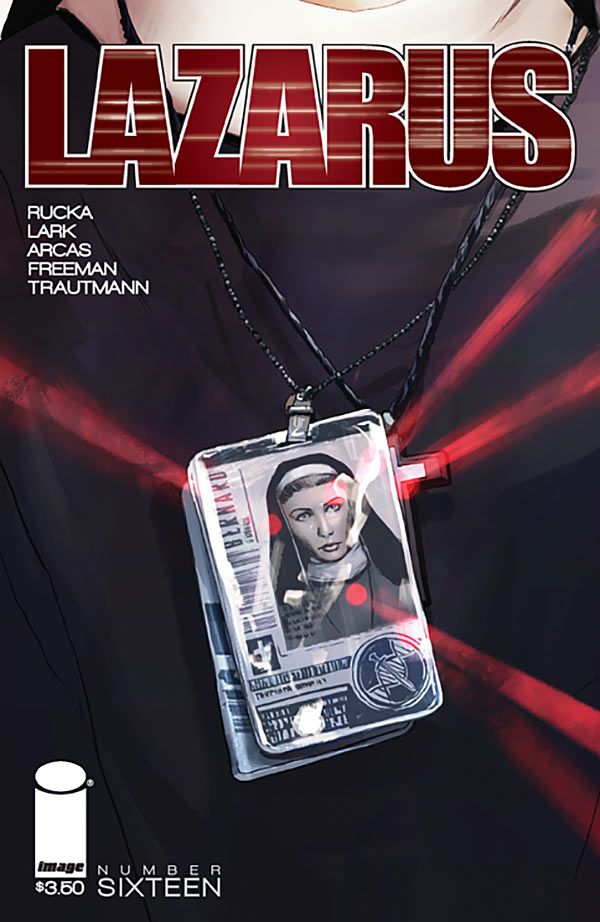"Lazarus" #16 by Greg Rucka and Michael Lark is a surprise in both content and form. Some previous issues took the spotlight off Forever Carlyle to follow other characters like Casey, Jonah Carlyle or the Barrets for brief periods of time, but the narrative was always straightforward, action-oriented and told in third person limited point of view. For the first time, Rucka uses a partial first person point of view, and it's not Forever's voice but rather that of a character from the sidelines, someone barely noticeable until now.
The issue is structured like a one-off, following Sister Bernard from the beginning of her covert mission to her destination on the last page. The narrative flows back and forth between textbox voiceovers and handwritten diary entries, covering the first days of war between Carlyle and Hock. This moment in time would be interesting from almost any character's perspective, but Rucka chooses Sister Bernard.
The speed of characterization by Rucka and Lark is intense, taking Sister Bernard from a bland stock character -- a stereotype of the do-gooder nun and doctor -- into a person who feels real. However temporary her borrowed time on Forever's stage, Sister Bernard is inevitably going to feel like a disappointment at first. The story is noticeably less visceral, less active. Her diary entries are intimate, but there's no doubt that they are much more passive than Rucka's usual dialogue-driven scenes, and Lark also draws the character in a way that makes her seem small and contained. Forever is large and vital, with the grace and presence of a superhero. Sister Bernard seems to barely move and she speaks aloud very little. She acts, but there's much less sweat and hand-to-hand combat and much more introspection and hand-wringing. Forever has only just woken up to moral independence, while Sister Bernard is a woman who has chosen a life defined by her moral beliefs already.
The heart of the difference is not just in personality. Sister Bernard is an ordinary good woman, not a saint or a hero. Her normality feels more boring than Forever's exceptional existence, at least on the surface. However, this gives Sister Bernard's perspective extra weight because she's not Family, and her intelligent observations on Hock's governance are chilling and invaluable.
Superficially a loyal soldier of both her religion and her deal with Carlyle, Sister Bernard wages a battle inside as she survives the battle outside. Rucka writes a traditional religious narrative, a "trials and tribulations" testing of faith, i.e. a Job story. During "Lazarus" #16, Carlyle cashes in on their part of a deal, and she questions her capacity to serve God, and whether she can serve Carlyle ("Caesar") and God at the same time. Though troubled and strained, her voice is clear and lucid, and the reader can feel her endurance and weariness in Rucka's prose.
The espionage and gunfire give her story some excitement, but Sister Bernard isn't comfortable with any of it, and the tone of her story is fearful, frustrated, restless, subdued and unhappy. In this way, she is less accessible than Forever, who is also struggling with fitting into the life she's always had, but who is more of an open book and ready to grow into a new identity.
The art by Lark, Freeman and Trautmann immerses the reader in Sister's Bernard's world. The creative team of "Lazarus" has always had impressive verisimilitude, particularly in the back matter, but the design of the pages in "Lazarus" #16 -- weaving together all kinds of documents and technology -- takes this dedication to a new level of impressiveness. Lark's transitions are superb throughout all the setting and media changes. His facial expressions are clear without being melodramatic. The Christ symbolism is present but not intrusive when Sister Bernard raises her hands in the last scene. His backgrounds, especially in Havana, are gorgeous. Arcas' colors are strong, except in the cathedral scenes, where the magenta monotone is overdone.
The ending is not a real surprise given the shape of the story, but Rucka and Lark are still able to create suspense by hitting all the right emotional notes, pulling the reader into Sister Bernard's hope and despair. This is a story about the demands of Power, both earthly and spiritual, and it feels like an open question as to whether the protagonist will be broken by being tested to her limits.
"Lazarus" #16 is an ingeniously constructed, ambitious issue. Sister Bernard's story advances the plot, enriches the world-building, provides a quiet beat in the larger arc and is an almost poetic tale of religious doubt and devotion in a time of war.

